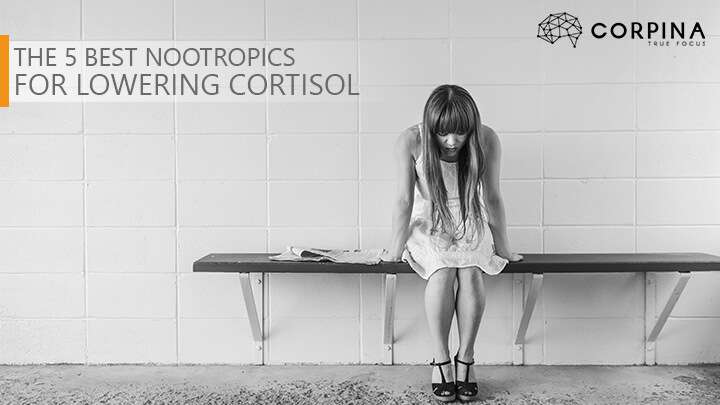The 5 Best Nootropics For Lowering Cortisol
It shouldn’t be surprising to know that stress is a huge problem these days. The economy is still in a slump, caffeine consumption is a constant, and many people are working psychologically pressing jobs with long commutes.
Of course, this is a rather negative way to view the world, but it is more than clear that stress takes its toll on everyone from time to time!
Those with personalities that are prone to anxiety, worry, and frustration are at special risk of suffering health issues related to constantly elevated stress levels.
You might question whether or not feelings can really affect the body so significantly, but there is a chemical explanation for the negative effects of stress.
The steroid hormone cortisol is the culprit behind the symptoms experienced with stress, especially the negative ones when it is present long-term.
Where does Cortisol come from?
On top of the kidneys lie the adrenal glands, which produce many of our body’s hormones such as epinephrine (or adrenaline), androgens, and of course cortisol.
In people with adrenal fatigue, there is a lack of output from their adrenal glands, causing symptoms such as weakness and low blood pressure.
What does it do?
For the regular burdens of everyday life, cortisol is fairly benign in its actions. It serves as a quick way to quickly increase glucose levels for the brain and ramp up overall energy production for a while.
This effect can be seen upon waking up in the morning – preparing a person to start moving around for the day. In the short term, cortisol also helps in the formation of emotional events in memory.
The real problem with long periods of stress is that extended release of cortisol has a number of negative physiological effects that can build up over time.
Many of them are visible, such as the premature aging of the skin due to breakdown of collagen. Weight gain and heightened blood pressure are common serious health concerns related to high cortisol levels, and are often directly related to stress.
What’s especially concerning to many users of nootropics (who want their minds working in tip-top shape), cortisol can be damaging to the brain.
In the long term, it inhibits the retrieval of already-stored information, which may be related to its effects on cells in the hippocampus. Stress makes it harder to think, especially when one is faced with it often.
How We Can Fight It
It’s unfortunate that stress and its associated lift in cortisol have such a toll on our bodies, but the good news is there are many ways to fight it. The obvious suggestion would be avoiding clear sources of stress when possible, but this isn’t always feasible.
Exercise has a significant impact on lowering cortisol levels in the long term, due to the feel-good chemicals it helps produce called endorphins.
Here on Corpina of course, we like to explore supplements that aid our lifestyles – especially nootropics. There are several excellent ways that supplementation can help relieve feelings of stress:
1. GABA
Anything that can raise levels of the inhibitory transmitter GABA tends to reduce perception of stress.
Some substances that help produce GABA include phenibut, picamilon and theanine. We’ve covered all of these here, and they are all quite commendable!
2. Magnesium
While most vitamins and minerals are easily found in the average western diet, many people lack a sufficient amount of magnesium. It’s necessary for proper muscle and nervous function, and plays a role in keeping general anxiety down.
If you’re one of the many people who are deficient, you could certainly benefit from a good magnesium supplement.
3. Magnolia Bark Extract
A somewhat strange material, this extract comes from the Houpu Magnolia tree that originates in China. It contains two major constituents, which are called Honokiol and Magnolol.
Magnolia bark extract has some activity with the GABA receptors, but also has the ability to block the effects of cortisol. It is also a potent antioxidant, adding to its value as a healthy supplement.
4. Ashwaganda
Ashwagandha is an herbal supplement with Indian origins. It has amazing stress-relief capabilities comparable to those of mainstream anti-anxiety or antidepressant medicines.
Ashwagandha may also be a promising alternative treatment for neurodegenerative diseases such as Alzheimer’s and Parkinson’s.
Ashwagandha has powerful antioxidant properties that seek and destroy the free radicals that have been implicated in aging and numerous disease states. Even more remarkable, emerging evidence suggests that ashwagandha has anti-cancer benefits as well.
5. Kratom
According to Wikipedia, Mitragyna speciosa, also known as ketum or Kratom, is a tropical deciduous and evergreen tree in the coffee family (Rubiaceae) native to Southeast Asia in the Indochina and Malaysia phytochoria (botanical regions), indigenous to Thailand where it has been used in traditional medicine.
Its leaves are used for a variety of potential medicinal effects, but mainly to manage pain and/or anxiety and alcohol dependence. Though not an opiate itself, kratom is thought to behave similarly to morphine, and thus is used for managing chronic pain as well as recreationally.
I personally haven’t used Kratom too much, but know many friends who have and they rave about it’s effects. They tell me that a cup of tea with kratom powder (aka “kratom tea”) is an amazing way to relax and wind down at the end of a long work day.
Conclusion
The lifestyle of any individual can be full of stress, and it’s inevitable.
However, we can avoid the negative effects on our bodies (AND OUR BRAINS!) by being aware of the hormone cortisol and ways to reduce it.
Whether we choose exercise, avoidance or supplementation, it’s important to our well-being to stay strong and relatively cortisol-free!

